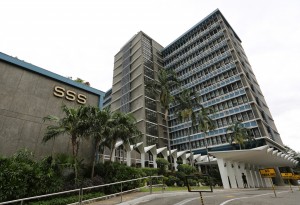
The Social Security System (SSS) Building on East Avenue, Quezon City. (Photo by RAFFY LERMA/Philippine Daily Inquirer)
Leaders of the militant but pro-administration group Bayan Muna urged President Rodrigo Duterte on Sunday to sign a congressional resolution for the P2,000 increase in the Social Security System (SSS) pension for its retired members, insisting that the hike would not lead to the bankruptcy of the state-run pension agency as claimed by the government’s top economic managers.
“The concession to give the pension increase in two tranches, on strong representations by the new SSS leadership, was in fact allowed by Congress so that the SSS can still raise more funds. Thus, it is utterly ridiculous for the three Cabinet secretaries to say that the agency would go bankrupt,” Bayan Muna party-list Rep. Carlos Zarate said in a statement.
Restructuring
Zarate was referring to Finance Secretary Carlos Dominguez III, Budget Secretary Benjamin Diokno and National Economic and Development Authority (Neda) Director General Ernesto Pernia who told Mr. Duterte late last year that there should be a restructuring of the SSS members’ contributions if the pension for senior citizens would be increased to P2,000.
The proposed pension hike, the economic managers warned, would raise the unfunded liabilities of SSS from P3.5 trillion to P5.9 trillion.
President Duterte has yet to sign the congressional resolution, saying he has to study it further.
Zarate is the one of the principal authors of House Joint Resolution No. 10 granting the increase that should begin this month.
Zarate said the P1,000 increase that would be distributed this month “would mean just P33 per day of additional funds for the elderly pensioners.”
Zarate and former Bayan Muna party-list Rep. Neri Colmenares railed against the economic managers, saying the three were trying to “sabotage the distribution of the P2,000 pension increase,” which the SSS administration said could actually be done as early as December last year.
Viability
Colmenares authored the bill for the pension increase in the 16th Congress which then President Benigno Aquino III vetoed precisely because such increase could compromise the viability of the SSS.
Zarate and Colmenares insisted that government had the money to sustain the SSS.
Fund life
“At most, the increase will only shorten the SSS fund life to 2025-2029 instead of the current 2042,” Colmenares said.
He added that 14 years was “more than enough time for the government and SSS to find ways to increase its fund life.”
“In 2001, SSS declared that it has a fund life of only five years and yet it was able to increase this to 2042 in just 14 years. If it previously survived a five-year fund life, then surely it can also survive a 14-year fund life,” Colmenares insisted.